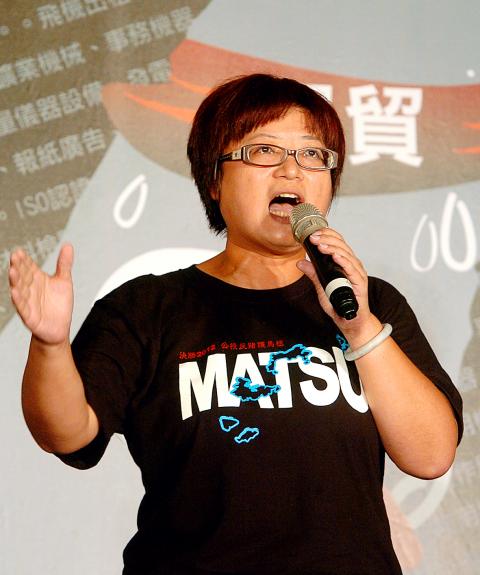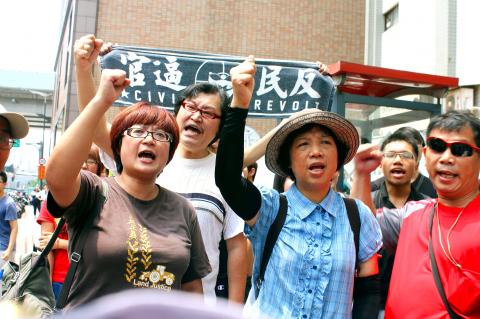Raised by her grandparents in a small farming village in Nantou County’s Yuchi (魚池) township, Frida Tsai (蔡培慧) had an identity crisis when she, then a young teen, moved to Taipei to live with her parents, and found everything she learned as part of her childhood upbringing was derided or seen as backward. Speaking proper Mandarin became the first priority on her study list so that others wouldn’t detect her rural origins.
For years, Tsai wanted to run away from home, but at the same time couldn’t stop longing to return to it.
“When I think of home, I think of the traditional sanheyuan residential compounds in Yuchi … For my generation, returning to the country was never an option. To have a bright future and strive for the best means to become a city person,” says Tsai, who is now an assistant professor at Shih Hsin University’s Graduate Institute for Social Transformation Studies.

Photo: TT
SEEKING RURALITY
Yet Tsai is not your typical academic. The university teacher goes out on the streets, organizes demonstrations and helps to lead hundreds, sometimes tens of thousands, of protestors as the spokeswoman of the Taiwan Rural Front (TRF, 台灣農村陣線), a social justice group dedicated to working with victims of the government’s forced land seizures and pushing for law and policy reforms.
Tsai attributes her social enlightenment to the experiences she had when working as an assistant to former indigenous lawmaker Walis Pelin. She particularly remembers a visit to a Paiwan (排灣) home in the then-Taipei County’s Shulin (樹林) to promote the Employment Service Act (就業服務法), which requires companies with more than 100 employees to hire indigenous workers.

Photo: TT
Tsai walked into a small rented apartment, finding not one but three Paiwan families living there, the parents working as laborers in the construction industry. One of them asked Tsai if she knew of any job opportunities.
“I cried after leaving the apartment, feeling like a phony and realizing how huge the gap is between what the law stipulates on paper and what individuals need in real life,” Tsai recalls.
In 1999, the magnitude 7 quake brought Tsai back to her childhood home, which had collapsed during the catastrophe. The Nantou native immediately threw herself into reconstruction projects. Through issuing funds to help survivors rebuild homes, Tsai came face to face with a completely different set of ideas and practices regarding land and ownership. In the countryside, for example, houses are sold, bought and inherited without legal records as people oftentimes “forget there is a thing called ‘the state.’” Many are built on public land; some, according to the title deeds that turn yellow with age, still belong to people who lived a hundred years ago.
Tsai and her colleagues had to indulge, argue and fight with government officials who didn’t understand why the fund should go into building “illegal housing.”
“In a modern system, it is important to have everything clearly registered. In the eyes of capitalism, ambiguity is not good because it impedes trade. But to country folk, there is nothing wrong with it. It is their shared cultural legacy,” Tsai says.
“The law becomes too limited and inadequate when we try to apply it to different cultures. The city has its own logic, and the country has its rurality,” she adds.
Consequently, when the TRF was founded in 2008 by a group of farmers, academics and students campaigning against the ill-conceived Rural Revitalization Act (農村再生條例), the farmers’ rights organization wanted not only to understand what really happens in rural communities, but learn how farmers think, and how they perceive everyday life.
Tsai gives an example of how rural thinking works. A few years ago when TRF research members Lin Le-xin (林樂昕) and Hsu Po-jen (許博任) went to investigate the land seizure in Siangsihliao (相思寮) in Changhua County’s Erlin Township (二林), the villagers at first thought they were government “spies.” Then one day at a meeting with government officials, the two helped to serve lunchboxes to the participating villagers and overheard them saying: “They are good kids. They are fine.”
“The village grannies have their way of observing and understanding the world. They trust you not because you come from such and such universities, but because you are a good kid and bring lunchboxes. And they say things like ‘the bandit leaves us a mouthful of rice to eat, but the government breaks our bowl’ (土匪還會留口飯,政府來卻弄破碗). These are the grassroots language and images that we want to repeat, spread and build to make them heard and recognized,” Tsai says.
GETTING PHYSICAL
Tsai values labor, not only the kind that gets your hands dirty, but also the dedication to constantly writing, discussing and narrating “what is important to our time.” The genial scholar’s devotion to the land, however, inevitably leads to her clashes with authorities. One incident took place in 2009, when Tsai and several other advocates hoped to speak at a meeting attended by President Ma Ying-jeou (馬英九). Asking them to wait until he finished his talk, Ma left the meeting right after the speech. Irked, Tsai rushed to Ma to deliver their petition but was stopped by his security detail. Later that day, the image of Tsai as a “middle-aged woman charging at Ma” was broadcast on national television. She couldn’t bring herself to watch television for a week and wrote an article reflecting on what being polite means.
“It got me thinking that if our body is a medium of expression, then why do we only accept the elegant body? Why can’t we accept a body that clashes, makes noise and brawls?” Tsai muses. “When you are barred and held back for merely attempting to deliver a petition, you realize that state violence is not an abstract idea. It is concrete. I think that when it comes to social movements, the bodily experience suggests a completely different approach to that of the abstract, such as the law and language.”
REFORM FROM BELOW
When asked whether the government’s handling of public issues will change, Tsai appears pessimistic. When hundreds of Hualong Textile Co employees launched a four-day march last year to protest against salary and pension cuts and layoff payouts, Tsai says that she was shocked by the indifference shown by the Ma administration.
The Presidential Office later said Ma acknowledged the workers’ situation, but it was not within their power to handle the issue.
“It sent chills down my spine. I remember thinking, ‘how can there be no response?’ My feeling is that Ma has his political agenda and chooses to pay no attention to domestic affairs. It doesn’t really matter now how protesters and social movement groups interact with the government,” she says.
But the TRF refuses to get discouraged, Tsai says, as the group intends to send more young people to rural communities to live and work, whether it is farming, running a small business or working at farmers’ associations or district offices. For Tsai, though law and policy reforms are important, changes need to be made from within too.
“[Miaoli county commissioner] Liu Cheng-hung (劉政鴻) and his confederates may look like gangsters, but they clean your clogged ditch and other problems. It is an issue of trust … We need young people to take part in public affairs in rural communities. Over the decades, Taiwan’s rural villages have gradually emptied. How is it possible for them to grow and develop again? And what will development look like? We don’t know, but we intend to find out,” Tsai says.

Taiwan has next to no political engagement in Myanmar, either with the ruling military junta nor the dozens of armed groups who’ve in the last five years taken over around two-thirds of the nation’s territory in a sprawling, patchwork civil war. But early last month, the leader of one relatively minor Burmese revolutionary faction, General Nerdah Bomya, who is also an alleged war criminal, made a low key visit to Taipei, where he met with a member of President William Lai’s (賴清德) staff, a retired Taiwanese military official and several academics. “I feel like Taiwan is a good example of

March 2 to March 8 Gunfire rang out along the shore of the frontline island of Lieyu (烈嶼) on a foggy afternoon on March 7, 1987. By the time it was over, about 20 unarmed Vietnamese refugees — men, women, elderly and children — were dead. They were hastily buried, followed by decades of silence. Months later, opposition politicians and journalists tried to uncover what had happened, but conflicting accounts only deepened the confusion. One version suggested that government troops had mistakenly killed their own operatives attempting to return home from Vietnam. The military maintained that the

Before the last section of the round-the-island railway was electrified, one old blue train still chugged back and forth between Pingtung County’s Fangliao (枋寮) and Taitung (台東) stations once a day. It was so slow, was so hot (it had no air conditioning) and covered such a short distance, that the low fare still failed to attract many riders. This relic of the past was finally retired when the South Link Line was fully electrified on Dec. 23, 2020. A wave of nostalgia surrounded the termination of the Ordinary Train service, as these train carriages had been in use for decades

Lori Sepich smoked for years and sometimes skipped taking her blood pressure medicine. But she never thought she’d have a heart attack. The possibility “just wasn’t registering with me,” said the 64-year-old from Memphis, Tennessee, who suffered two of them 13 years apart. She’s far from alone. More than 60 million women in the US live with cardiovascular disease, which includes heart disease as well as stroke, heart failure and atrial fibrillation. And despite the myth that heart attacks mostly strike men, women are vulnerable too. Overall in the US, 1 in 5 women dies of cardiovascular disease each year, 37,000 of them